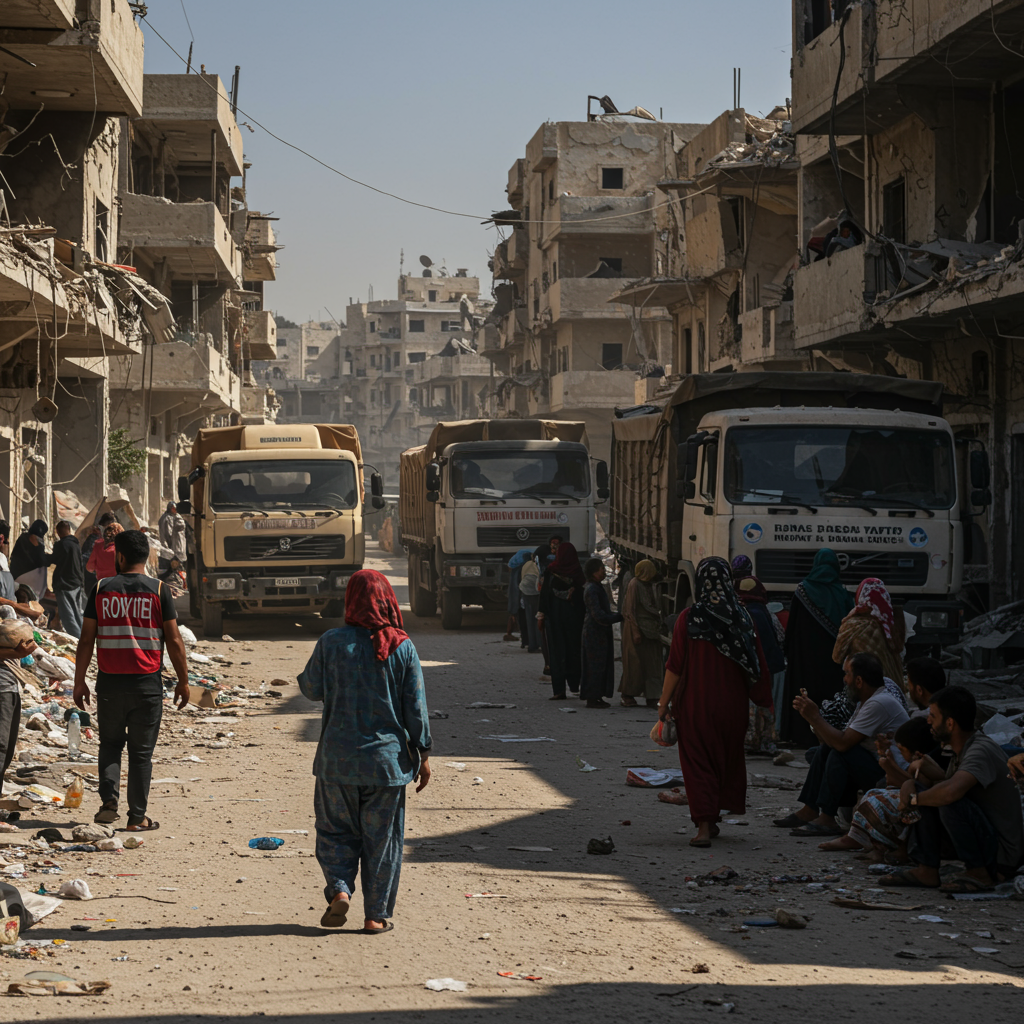Urgent diplomatic efforts are intensifying to broker a lasting Gaza ceasefire, following a U.S.-backed peace proposal. As President Donald Trump’s deadline for Hamas to accept the plan expired on Sunday, October 5, 2025, complex Gaza ceasefire negotiations are underway, striving to halt military operations and secure the release of hostages. These high-stakes talks unfold against a backdrop of severe humanitarian devastation and sharply divided political stances, making a comprehensive resolution incredibly challenging.
US-Led Peace Initiative Takes Center Stage
A pivotal moment in the Israel-Gaza conflict arrived with President Trump’s peace plan, unveiled earlier in the week. The proposal aimed to establish an “IMMEDIATELY effective” ceasefire upon Hamas’s acceptance. A strict deadline was set for Sunday, October 5, at 6 p.m. ET, for the militant group to formally agree. Trump emphasized the urgency, warning Hamas to “move quickly, or else all bets will be off,” and declared he would “not tolerate delay.” The plan also outlined a phased withdrawal of the Israel Defense Forces (IDF) and a comprehensive exchange of hostages and prisoners.
Hamas offered a conditional agreement on Friday, signaling its readiness to release all remaining Israeli detainees. However, this commitment hinges on two crucial demands: a complete Israeli withdrawal from Gaza and the fulfillment of “proper field conditions.” The group stressed that further negotiations would be essential to iron out the intricate details of any final accord. To facilitate these delicate discussions, U.S. special envoys Steve Witkoff and Jared Kushner were dispatched to Egypt, joining mediating teams for indirect talks.
Israel’s Firm Stance Amidst Ongoing Operations
Despite the push for a Gaza ceasefire deal, Israeli Prime Minister Benjamin Netanyahu has maintained a resolute position. He declared Israel to be “on the verge of a very great achievement,” expressing optimism for the swift return of all hostages, both living and deceased. Crucially, Netanyahu affirmed that the IDF would retain control of all territories it currently holds within the Gaza Strip, even in the initial phase of any agreement. This stance clearly indicates a refusal for a full withdrawal, directly conflicting with Hamas’s key demand.
Netanyahu also reiterated Israel’s unwavering opposition to an independent Palestinian state. This position stands in stark contrast to recent moves by several Western nations, which have recognized Palestinian statehood while simultaneously demanding that Hamas be excluded from any future Palestinian government. A senior Israeli official clarified that any pause in IDF offensive activity is purely tactical, designed to allow Hamas to organize hostage releases, not to signal a ceasefire or withdrawal. Israel remains vigilant against Hamas exploiting any operational lulls.
A Deepening Humanitarian Catastrophe Unfolds in Gaza
The urgency of the Gaza ceasefire negotiations is amplified by a catastrophic humanitarian crisis. On Sunday, October 5, the Hamas-run Ministry of Health in Gaza reported another death due to famine and malnutrition, bringing the total to 460, including 154 children. Since the Integrated Food Security Phase Classification platform declared famine in Gaza on August 22, 182 malnutrition-related deaths, including 39 children, have been officially recorded.
Beyond starvation, Israeli military actions continue to inflict a heavy toll. Hospitals across the Gaza Strip reported 65 deaths and 153 injuries in the past 24 hours, including two aid seekers. The overall death toll for Palestinians since October 2023 has reached an staggering 67,139. Alarmingly, 2,605 of these deaths, occurring since May 28, were among individuals attempting to access food at distribution points. This dire situation has triggered mass displacement, with over 70,000 fleeing northern Gaza recently, and 150,000 in the past month. UNICEF described this forced displacement as “inhumane,” underscoring the severe trauma faced by nearly half a million children. Many Gaza City residents, however, refuse to leave, expressing a preference to die in their homes rather than face further exile and overcrowded conditions in the south.
Urgent Diplomatic Efforts and International Pressure
Egypt has stepped forward to host critical ceasefire talks on Monday, October 6, with representatives from both Israel and Hamas. These discussions aim to build on the momentum generated by the Trump peace plan. The agenda includes “ground conditions and details of the exchange of all Israeli detainees and Palestinian prisoners.” High-level U.S. envoys, including Steve Witkoff and Jared Kushner, have already traveled to Egypt, underscoring the urgency. The Egyptian Foreign Ministry expressed hope that these talks would “end the war and alleviate the suffering of the brotherly Palestinian people, which has continued for two consecutive years.”
International pressure on Israel is mounting significantly. An independent United Nations commission recently concluded that Israel is committing genocide in Gaza, citing “genocidal intent” based on official statements and military conduct. This includes deliberately imposing starvation and inhumane living conditions. The report specifically named Prime Minister Netanyahu, President Isaac Herzog, and former Defense Minister Yoav Gallant as inciting genocide. The commission urged global intervention, stating that “inaction amounts to complicity,” a claim Israel has dismissed as “distorted and false.”
Internal and Global Divisions Intensify
The path to a durable Gaza ceasefire is further complicated by internal divisions and international condemnations. President Trump, despite his optimism for the peace proposal, reportedly expressed frustration with Prime Minister Netanyahu. Axios reported Trump’s anger at Netanyahu’s perceived negative reaction to Hamas’s conditional agreement, which Trump viewed as a “win.” The U.S. Secretary of State also visited Qatar, a crucial mediator, amid “fury” over an Israeli strike on Hamas negotiators in Doha, which UN Human Rights Chief Volker Türk condemned as a “shocking breach of international law.”
Within Israel, the Gaza operation is revealing cracks at the highest levels. The IDF Chief of Staff reportedly voiced concerns about Netanyahu’s plan to control Gaza City, citing reservist exhaustion, hostage safety, and a lack of a clear “day after” strategy. Families of Israeli hostages have also protested outside Netanyahu’s residence, accusing him of prioritizing military action over negotiations and fearing for their loved ones’ lives amidst the bombing. The international community’s outrage is palpable, with UK Foreign Secretary Yvette Cooper calling the offensive “utterly reckless and appalling.” The EU is even considering reimposing duties on Israeli goods as a pressure tactic.
Regional Escalation and Broader Implications
The conflict’s ripple effects are extending regionally and globally. Sirens sounded in Israel after a projectile launch from Yemen, leading to retaliatory Israeli airstrikes on Houthi military targets. Culturally, the conflict has prompted calls for boycotts, with Spain, Ireland, and the Netherlands threatening to withdraw from the Eurovision Song Contest if Israel participates. Spanish Prime Minister Pedro Sánchez has gone further, calling for Israel’s ban from international sports competitions due to its “barbaric acts” in Gaza.
These developments highlight the profound complexities surrounding the Hamas hostage deal and broader peace efforts. The blend of military objectives, humanitarian catastrophe, political posturing, and international pressure creates an extremely volatile environment where every diplomatic move carries immense weight. The upcoming talks in Egypt will be a critical test for all parties involved, determining whether the current “momentum” can translate into tangible relief for the region.
Frequently Asked Questions
What are the main conditions Hamas has set for the Gaza ceasefire deal?
Hamas has agreed to release all remaining Israeli hostages, but only if Israel fully withdraws from the Gaza Strip and “proper field conditions are met.” The group emphasized that additional negotiations would be necessary to finalize the specific terms and operational details of any agreement, suggesting a complex path ahead beyond the initial conditional acceptance.
How severe is the humanitarian crisis in Gaza, according to recent reports?
The humanitarian crisis in Gaza is profoundly severe. As of October 5, 2025, the Hamas-run Ministry of Health reported 460 malnutrition-related deaths, including 154 children, since the war began. Famine was officially declared on August 22, leading to 182 recorded malnutrition deaths since then. Furthermore, Israeli military actions resulted in 65 deaths and 153 injuries in a single 24-hour period, with over 67,000 Palestinians killed since October 2023.
What is the stance of the Israeli government regarding an independent Palestinian state?
Israeli Prime Minister Benjamin Netanyahu has explicitly stated that Israel will not permit the existence of an independent Palestinian state. This position contrasts with recent recognition of Palestinian statehood by several Western nations. Netanyahu also affirmed that even with a peace deal, the IDF would maintain control over territories deep inside the Gaza Strip, rejecting Hamas’s demand for a full Israeli withdrawal.
The current diplomatic efforts represent a critical juncture in a conflict marked by immense human suffering and deep-seated political divisions. As the Egypt talks commence, the world watches closely for any signs of a breakthrough that could lead to a lasting Gaza ceasefire and alleviate the suffering of millions. The convergence of Trump’s initiative, Hamas’s conditional response, and unwavering Israeli demands underscores the arduous path toward peace in the region.


